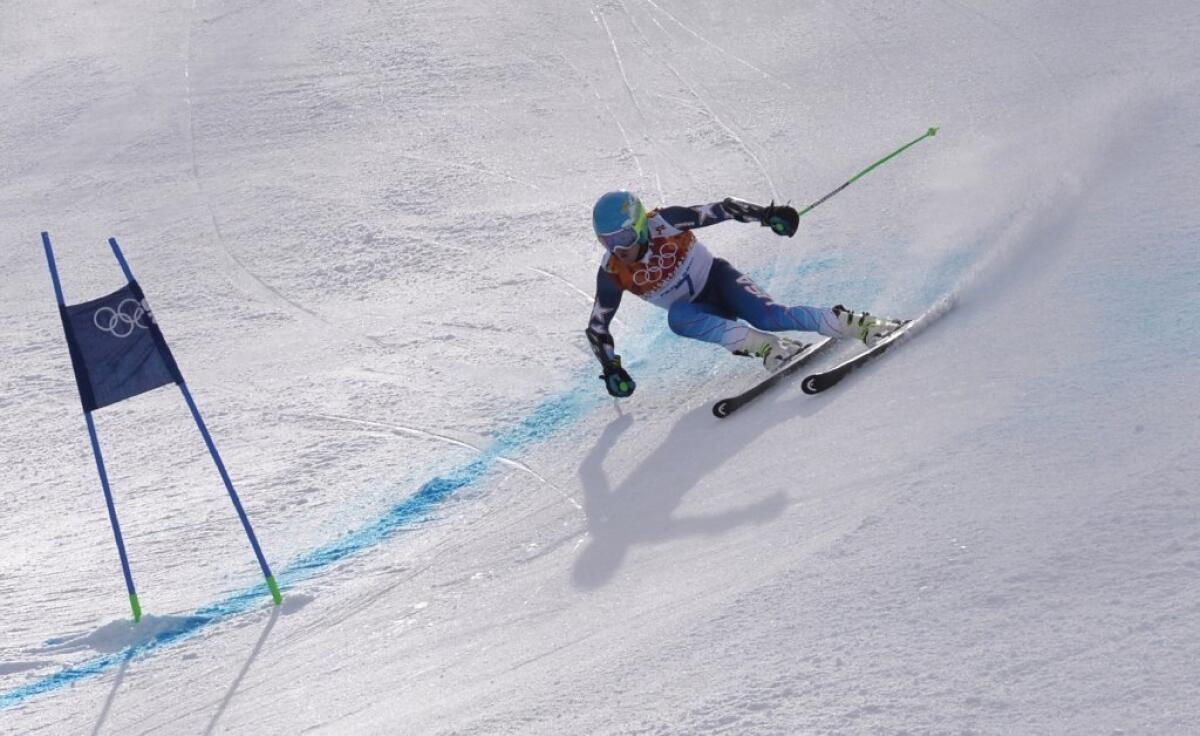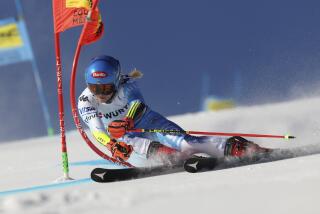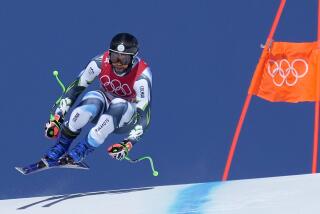Sochi Olympics: U.S.’ Ted Ligety wins gold medal in giant slalom

SOCHI, Russia — Ted Ligety won the giant slalom at the Sochi Games with a dominating performance Wednesday, becoming the first American man to win two Olympic gold medals in Alpine skiing.
Leading after the first run, Ligety sped down the Rosa Khutor course in a two-leg combined time of 2 minutes, 45.29 seconds.
Steve Missillier of France stood only 10th after the first run but had the fastest second leg to finish second, 0.48 behind. Alexis Pinturault, another Frenchman and one of Ligety’s chief rivals over the past few seasons, was third, 0.64 behind.
Overall World Cup leader Marcel Hirscher of Austria finished fourth, 0.94 back, but will be the favorite for Saturday’s slalom.
Ligety’s first gold came in combined at the 2006 Turin Games as a 21-year-old — before he had ever won a World Cup race.
The only other American to win two Olympic golds in Alpine skiing was Andrea Mead Lawrence, who took both the women’s slalom and giant slalom at the 1952 Oslo Games.
Four other American men — Bode Miller, Phil Mahre, Tommy Moe and Bill Johnson — have won one Olympic gold.
Ligety celebrated by twirling around in the finish area while still on his skis. The crowd realized he had won even before he crossed the line, and showered him with applause for the last few gates.
Ligety had such a large lead after the opening run — 0.93 seconds — that he could afford to ease up a bit on his second trip down and he was only 14th fastest in the afternoon leg.
But that was more than enough to give the U.S. its first gold in Alpine skiing of the Sochi Games.
Conditions were perfect, with the temperature hovering near the freezing level and skies partly cloudy.
In both runs, Ligety showed off his unparalleled technique of arcing turns, leaning down and touching the snow with his hips, gloves and thighs at every opportunity to get the best angles. Other skiers displayed sharper turns but Ligety’s were far more fluid.
“Ted goes so round that his turn is naturally a longer radius,” said Miller, who finished 20th in what he said was his final race in Sochi. “He generates more speed and links one turn to the next and because he has so much space, he never pinches or gets in trouble because he’s always way far from the gate.”
Ligety has been the best giant slalom skier for several years, although after failing to win a medal at the 2010 Vancouver Games, this was his crowning achievement.
Ligety won nine of 14 World Cup giant slalom races this season and last season. He took gold in GS at the last two world championships and won the season-long World Cup title in the discipline four of the last six years.
“I think he’s one of the best GS skiers in history,” Miller said. “He’s so much better at it than everybody else. … He just is so consistent. He makes no errors. And anybody who’s trying to cut off line just ends up making mistakes and it makes a huge gap.”
At last year’s worlds in Schladming, Austria, Ligety also won gold in super-G and super-combined, making him the first man with at least three golds at a worlds since Jean Claude Killy earned four back in 1968.
At 29, Missillier had not achieved that much in his career. His only podium result on the World Cup circuit was a third-place finish in a slalom on home snow in Val d’Isere in December 2010.
After Ligety and Hirscher, Pinturault has been among the best GS skiers over the past four seasons, compiling one win and nine podium results.
ALSO:
American figure skater Gracie Gold learns to let go
Vic Wild wins gold for Russia in men’s parallel giant slalom
Anze Kopitar, Slovenia can feel proud despite loss to Sweden
More to Read
Go beyond the scoreboard
Get the latest on L.A.'s teams in the daily Sports Report newsletter.
You may occasionally receive promotional content from the Los Angeles Times.






